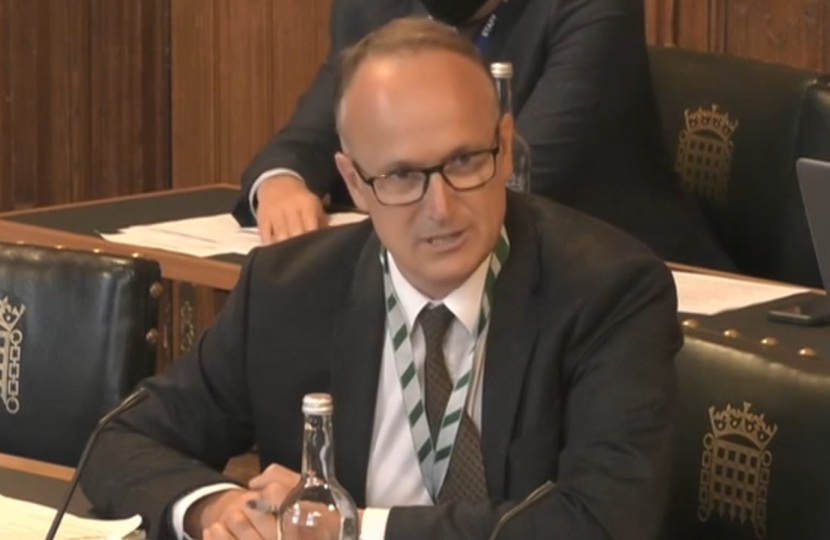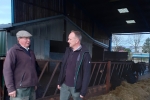
House of Commons
Environment, Food and Rural Affairs Select Committee
EFRA Committee Report urges Government to press go on evident and ready solutions to post-Brexit movement of animals between UK and EU
Government stalls on adequate post-Brexit provisions for animal movement, jeopardising animal welfare, biosecurity and UK livestock and agri-food businesses
UK businesses at risk, while Government stalls on measures to facilitate the movement of livestock, reduce the smuggling of pets and horses and improve animal welfare
Despite evidence of a 'low-risk, high-reward' trade in illegal pet and horse smuggling, prosecution rates remain low, with adverse effects on animal welfare and biosecurity. In its new Report, Moving Animals Across Borders, the House of Commons Environment, Food and Rural Affairs Committee, MPs call on the Government to act urgently to address pet and horse smuggling over the UK border.
With little to no enforcement of laws preventing the illegal importation of domestic animals, not only should Government to introduce harsher sentences for pet smugglers, but it must also make full use of its enforcement powers, say the MPs.
Government inertia is also stalling measures to facilitate movement of livestock, putting UK businesses at risk. The Report identifies an "effective ban" on the export of live animals to the EU for breeding, due to inadequate border controls, despite continued imports of livestock from the trading bloc, leaving the UK at a competitive disadvantage.
The Report finds there are evident and ready solutions for many of the problems threatening exporters' livelihoods, animal welfare and UK biosecurity, but the Government's low-priority approach to implementation fails to recognise the significance of stakeholders' concerns. Echoing calls made by the cross-party group of MPs in April 2021, the Committee urges the Government to adopt a 'pragmatic' approach in negotiations with the EU, ensuring that border controls are operational at both UK and EU borders no later than March 2022.
The Report's recommendations include:
- Greater use of custodial sentences for pet smugglers, prioritising increased prosecution rates. The Report notes that prosecution rates are proportionately low given the estimated size of the trade.
- The introduction pre-import screening for non-endemic diseases which threaten the UK pet population. A number of non-endemic canine diseases are on the rise in the UK, posing a serious health risk to the UK pet population.
- The Committee welcome the Government's proposed ban on the export of live animals for slaughter as an important step in improving animal welfare. However, the Report raises concerns about the unintended consequences of such a move, including increasing travel time between farm and slaughter due to scare provision of specialist domestic abattoirs.
- The Government must support and bolster a network of small and medium abattoirs spread geographically around the UK. The Report finds a 'direct link' between the Government's current policy of limiting journey times for animals transported to slaughter, and the need for a network of small and medium abattoirs.
- The Government and the EU must work together to secure an agreement on ‘high health status’ horses to allow for the expedited movement of horses across Europe.
- The Government must investigate the scale and causes of horse smuggling as there are a considerable number of horses are being illicitly moved out of the UK.
- The creation of an easy to use, digital-by-design equine identification system. This should form the basis of the Government's forthcoming consultation on horse identification.
- Regaining UK access to the EU's Animal Disease Notification System, allowing easier monitoring of animal diseases.
Please find the full report at the attached link: https://committees.parliament.uk/publications/7464/documents/78149/defa…;
Neil Parish MP, Chair of the EFRA Select Committee, said:
“While the Government twiddles its thumbs, bad actors are seizing the opportunity to bring animals- including kittens and puppies- over the borders, risking their welfare and the spread of diseases, with little fear of detection or punishment. Meanwhile, the systems required to identify equines, which already exist within the industry, have been overlooked, allowing an illegal and cruel trade in horse smuggling to flourish.
"Despite a drastically shrunk livestock export market, the Government is dragging its heels setting up the border controls that exporters of British breeding stock need. All of these issues identify glaring holes in the Government's current systems.
"The solutions are ready, but the Government seems unprepared to press go. It must now demonstrate its willingness to accept the scale of the problems, and act with urgency to address the threats to British businesses, animal welfare and biosecurity."
Dr Neil Hudson MP for Penrith and The Border, Member of the EFRA Select Committee and veterinary surgeon said:
“Our cross party EFRA Select Committee has produced a timely and important report calling on the Government to take urgent action to improve the health and welfare of animals transported across national borders. We are calling for tough action on puppy smuggling, an increase in the minimum age of travel for pets to 6 months, and for health checks and preventative treatments to be instituted for pets coming into the UK. We are also calling for a tightening up of identification of horses to stop the dreadful illegal smuggling of horses for slaughter and for a return to the seamless transport of high health status horses . The measures outlined in our report will help pets, farm livestock and horses and also support UK businesses working in the farm and equine sectors.”
A full list of Committee membership can be found here.





